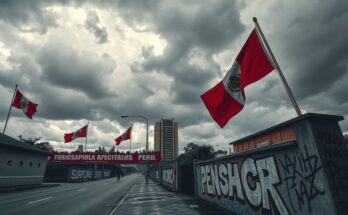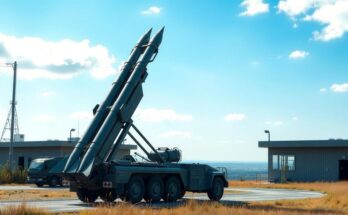Ecuador’s presidential election sees incumbent Daniel Noboa competing against Luisa Gonzalez, amid security and economic crises intensified by cartel violence. As Noboa seeks re-election with claims of progress through military deployment, Gonzalez urges a balance of security and social reform. The election’s outcome will significantly influence Ecuador’s future as crime and economic instability challenge voters’ priorities.
Ecuador’s presidential election, taking place amid pressing security issues and economic challenges, sees incumbent President Daniel Noboa seeking re-election against prominent challenger Luisa Gonzalez. With polls opening at 7 AM local time, citizens are focused on the candidates’ approaches to an escalating crime problem that has transformed the nation from one of safety to a region plagued by violence.
Daniel Noboa, 37, elected just 14 months ago as a hard-right leader, faces 15 rivals including Gonzalez, a 47-year-old left-wing lawmaker and ally of former President Rafael Correa. Under Noboa’s leadership, described as having a firm approach or “mano dura” to crime, he maintains a leading position in polls. If no candidate achieves the required majority, a runoff vote will occur.
The campaigns have significantly centered on Ecuador’s economic decline and the violent confrontations arising from cartel activities. Noboa claims that military deployment on the streets and in prisons has decreased violent deaths by 15% and curtailed prison violence, while also capturing major gang leaders. He asserts, “Today, Ecuador has changed and wants to keep changing… reclaim your ability to dream.”
Conversely, Gonzalez argues that a multidimensional approach incorporating social reforms is essential to tackling the crime crisis. She emphasizes the need for both military and police operations, alongside efforts to enhance social justice in the nation. Gonzalez insists on the necessity of building “an Ecuador with peace, not with war,” uniting citizens in her vision for transformation.
Noboa’s administration has tightened control through a declared state of emergency, deploying military force to tackle increasing violence from rival drug gangs. Despite nobility claims of success, human rights organizations have raised concerns about potential abuses linked to the heavy-handed military response, such as the tragic case of four boys found dead near an army base.
The rising strife has coincided with significant economic downturns, compelling Noboa to seek assistance from the International Monetary Fund (IMF). Gonzalez, addressing concerns over her potential policies, acknowledged the IMF’s role, expressing conditions for collaboration that consider the well-being of working families in Ecuador, aiming for balance between fiscal stability and social welfare.
Ecuador faces a significant turning point in its political climate as voters engage in a crucial presidential election characterized by security concerns and economic instability. With a backdrop of rising crime rates and the influence of drug cartels, citizens are poised to elect a leader who can effectively address these dire issues. Candidates present vastly different visions for handling the nation’s challenges, reflecting the urgent need for solutions in a nation grappling with change.
In conclusion, the outcome of the Ecuadorian presidential election is poised to profoundly impact the nation’s approach to security and economic recovery. Candidates Daniel Noboa and Luisa Gonzalez represent contrasting philosophies, with Noboa endorsing a stringent military response to crime, while Gonzalez advocates for both security measures and social justice. As voters cast their ballots, the future direction of Ecuador will hinge on their choice amidst a backdrop of critical urgency.
Original Source: www.aljazeera.com




